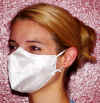Oh, wait...
A detective who retired from the New York Police Department in 2004 because of illness related to Sept. 11 died last week, a union official said...Ah yes, yet another failure of the Bush government. Think I'm being too critical? Well, a $12 million research and monitoring program at New York's Mount Sinai Hospital for ground-zero rescue workers yielded the following results:
The detective, James Zadroga, 34, who ended his career with an elite Manhattan homicide unit, died of pulmonary disease on Thursday at his parents' home in New Jersey, said Michael J. Palladino, president of the Detectives' Endowment Association.
Other detectives have retired from the department because of disabilities resulting from the terrorist attacks of Sept. 11, 2001, but Mr. Zadroga is the first emergency responder to die of a related illness, Mr. Palladino said. The Police Department could not immediately provide the number of officers who have retired because of 9/11-related injuries.
"He was in Building 7 when it collapsed, and he narrowly escaped death," Mr. Palladino said. "For the next month, he worked 12 or 13 hours a day, a total of more than 450 hours, in the rescue and recovery effort."
Soon afterward, Detective Zadroga complained of shortness of breath and was found to have fiberglass in his lungs, Mr. Palladino said.
Of the 12,000 workers and volunteers Mount Sinai has screened so far, sampling suggests that about half have persistent respiratory problems, such as asthma, inflammation and sinusitis, Levin said. For some, the illness is so severe that they can't work.The EPA inspectors, by the way, examined ground-zero wearing complete, head to toe toxic safety regalia. The majority of rescue workers were lucky if they were wearing one of these:
Of the estimated 6,000 with symptoms, none has recovered completely. About 300 firefighters have retired with disabilities from injuries and illnesses they believe are related to World Trade Center work.
The attacks sent up a toxic mix of asbestos, ground glass, concrete and dangerous chemicals such as benzene. The toxic cloud was bound to make some people sick. But Levin said the bigger priority for the government was reopening the financial markets and showing the world that America would not be cowed. People's health was secondary, he said.
On Sept. 18, 2001, the Environmental Protection Agency issued a statement saying the air in Lower Manhattan was safe to breathe even though the EPA had not finished tests for mercury, cadmium, lead, dioxin and other chemicals. The EPA Inspector General, an internal watchdog, released a report last summer seconding Levin's criticisms, and suggesting White House pressure affected the judgment that the air was clean.

No comments:
Post a Comment